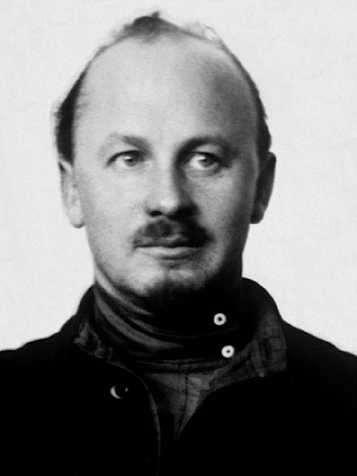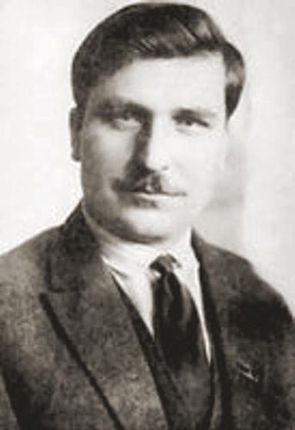|
Grigory Petrovsky
Grigory Ivanovich Petrovsky (russian: Григо́рий Ива́нович Петро́вский, uk, Григо́рій Іва́нович Петро́вський, translit=Hryhorii Ivanovych Petrovskyi) (3 February 1878 - 9 January 1958) was a Ukrainian Soviet politician and Old Bolshevik. He participated in signing the Treaty on the Creation of the USSR and the Treaty of Brest-Litovsk. Petrovsky was Communist Party leader in Ukraine until 1938, and one of the officials responsible for implementing Stalin's policy of collectivization. Biography Early years Petrovsky was born in the village of Pechenihy in Kharkov Governorate on 3 February (Old Style - 22 January) 1878, in the family of a craftsman (some sources claim - son of tailor and laundrywoman). Grigory's father died when he was three. Petrovsky had two siblings. After finishing two classes of school at the Kharkiv Theological Seminary in 1889, Petrovsky was dismissed for not being able to pay for his tuition. B ... [...More Info...] [...Related Items...] OR: [Wikipedia] [Google] [Baidu] |
Soviet
The Soviet Union,. officially the Union of Soviet Socialist Republics. (USSR),. was a List of former transcontinental countries#Since 1700, transcontinental country that spanned much of Eurasia from 1922 to 1991. A flagship communist state, it was nominally a Federation, federal union of Republics of the Soviet Union, fifteen national republics; in practice, both Government of the Soviet Union, its government and Economy of the Soviet Union, its economy were highly Soviet-type economic planning, centralized until its final years. It was a one-party state governed by the Communist Party of the Soviet Union, with the city of Moscow serving as its capital as well as that of its largest and most populous republic: the Russian Soviet Federative Socialist Republic, Russian SFSR. Other major cities included Saint Petersburg, Leningrad (Russian SFSR), Kyiv, Kiev (Ukrainian Soviet Socialist Republic, Ukrainian SSR), Minsk (Byelorussian Soviet Socialist Republic, Byelorussian SSR), Tas ... [...More Info...] [...Related Items...] OR: [Wikipedia] [Google] [Baidu] |
13th Politburo Of The All-Union Communist Party (Bolsheviks) ...
The Politburo of the 13th Congress of the All-Union Communist Party (Bolsheviks) was in session from 2 June 1924 to 1 January 1926. Composition Members Candidates References {{Communist Party of the Soviet Union Politburo of the Central Committee of the Communist Party of the Soviet Union members Politburo Politburo Politburo Politburo Politburo A politburo () or political bureau is the executive committee for communist parties. It is present in most former and existing communist states. Names The term "politburo" in English comes from the Russian ''Politbyuro'' (), itself a contraction ... [...More Info...] [...Related Items...] OR: [Wikipedia] [Google] [Baidu] |
Order Of Lenin
The Order of Lenin (russian: –û—Ä–¥–µ–Ω –õ–µ–Ω–∏–Ω–∞, Orden Lenina, ), named after the leader of the Russian October Revolution, was established by the Central Executive Committee on April 6, 1930. The order was the highest civilian decoration bestowed by the Soviet Union. The order was awarded to: * Civilians for outstanding services rendered to the State * Members of the armed forces for exemplary service * Those who promoted friendship and cooperation between people and in strengthening peace * Those with meritorious services to the Soviet state and society From 1944 to 1957, before the institution of a specific length of service medals, the Order of Lenin was also used to reward 25 years of conspicuous military service. Those who were awarded the titles "Hero of the Soviet Union" and " Hero of Socialist Labour" were also given the order as part of the award. It was also bestowed on cities, companies, factories, regions, military units, and ships. Various educational instituti ... [...More Info...] [...Related Items...] OR: [Wikipedia] [Google] [Baidu] |
Soviet Union
The Soviet Union,. officially the Union of Soviet Socialist Republics. (USSR),. was a transcontinental country that spanned much of Eurasia from 1922 to 1991. A flagship communist state, it was nominally a federal union of fifteen national republics; in practice, both its government and its economy were highly centralized until its final years. It was a one-party state governed by the Communist Party of the Soviet Union, with the city of Moscow serving as its capital as well as that of its largest and most populous republic: the Russian SFSR. Other major cities included Leningrad (Russian SFSR), Kiev (Ukrainian SSR), Minsk ( Byelorussian SSR), Tashkent (Uzbek SSR), Alma-Ata (Kazakh SSR), and Novosibirsk (Russian SFSR). It was the largest country in the world, covering over and spanning eleven time zones. The country's roots lay in the October Revolution of 1917, when the Bolsheviks, under the leadership of Vladimir Lenin, overthrew the Russian Provisional Government ... [...More Info...] [...Related Items...] OR: [Wikipedia] [Google] [Baidu] |
Russian SFSR
The Russian Soviet Federative Socialist Republic, Russian SFSR or RSFSR ( rus, –Ý–æ—Å—Å–∏–π—Å–∫–∞—è –°–æ–≤–µ—Ç—Å–∫–∞—è –§–µ–¥–µ—Ä–∞—Ç–∏–≤–Ω–∞—è –°–æ—Ü–∏–∞–ª–∏—Å—Ç–∏—á–µ—Å–∫–∞—è –Ý–µ—Å–ø—É–±–ª–∏–∫–∞, Ross√≠yskaya Sov√©tskaya Federat√≠vnaya Socialist√≠ƒçeskaya Resp√∫blika, r…êÀàs ≤ijsk…ôj…ô s…êÀàv ≤etsk…ôj…ô f ≤…™d ≤…™r…êÀàt ≤ivn…ôj…ô s…ôts…®…ôl ≤…™Ààs ≤t ≤it…ï…™sk…ôj…ô r ≤…™Ààspubl ≤…™k…ô, Ru-–Ý–æ—Å—Å–∏–π—Å–∫–∞—è –°–æ–≤–µ—Ç—Å–∫–∞—è –§–µ–¥–µ—Ä–∞—Ç–∏–≤–Ω–∞—è –°–æ—Ü–∏–∞–ª–∏—Å—Ç–∏—á–µ—Å–∫–∞—è –Ý–µ—Å–ø—É–±–ª–∏–∫–∞.ogg), previously known as the Russian Soviet Republic and the Russian Socialist Federative Soviet Republic as well as being unofficially known as Soviet Russia,Declaration of Rights of the laboring and exploited people, article I. the Russian Federation or simply Russia, was an Independence, independent Federalism, federal socialist state from 1917 to 1922, and afterwards the largest and most populous of the Republics of the Soviet Union, Soviet socialist republics of the So ... [...More Info...] [...Related Items...] OR: [Wikipedia] [Google] [Baidu] |
Moscow
Moscow ( , US chiefly ; rus, links=no, –ú–æ—Å–∫–≤–∞, r=Moskva, p=m…êskÀàva, a=–ú–æ—Å–∫–≤–∞.ogg) is the capital and largest city of Russia. The city stands on the Moskva River in Central Russia, with a population estimated at 13.0 million residents within the city limits, over 17 million residents in the urban area, and over 21.5 million residents in the metropolitan area. The city covers an area of , while the urban area covers , and the metropolitan area covers over . Moscow is among the world's largest cities; being the most populous city entirely in Europe, the largest urban and metropolitan area in Europe, and the largest city by land area on the European continent. First documented in 1147, Moscow grew to become a prosperous and powerful city that served as the capital of the Grand Duchy that bears its name. When the Grand Duchy of Moscow evolved into the Tsardom of Russia, Moscow remained the political and economic center for most of the Tsardom's history. When th ... [...More Info...] [...Related Items...] OR: [Wikipedia] [Google] [Baidu] |
Russian Empire
The Russian Empire was an empire and the final period of the Russian monarchy from 1721 to 1917, ruling across large parts of Eurasia. It succeeded the Tsardom of Russia following the Treaty of Nystad, which ended the Great Northern War. The rise of the Russian Empire coincided with the decline of neighbouring rival powers: the Swedish Empire, the Polish–Lithuanian Commonwealth, Qajar Iran, the Ottoman Empire, and Qing China. It also held colonies in North America between 1799 and 1867. Covering an area of approximately , it remains the third-largest empire in history, surpassed only by the British Empire and the Mongol Empire; it ruled over a population of 125.6 million people per the 1897 Russian census, which was the only census carried out during the entire imperial period. Owing to its geographic extent across three continents at its peak, it featured great ethnic, linguistic, religious, and economic diversity. From the 10th–17th centuries, the land ... [...More Info...] [...Related Items...] OR: [Wikipedia] [Google] [Baidu] |
Kharkov Governorate
The Kharkov Governorate ( pre-reform Russian: , tr. ''Kh√°rkovskaya gub√©rniya'', IPA: ÔøΩxar ≤k…ôfsk…ôj…ô …° äÀàb ≤ern ≤…™j…ô ) was a governorate of the Russian Empire founded in 1835. It embraced the historical region of Sloboda Ukraine. From 1765 to 1780 and from 1796 to 1835 the governorate was called the Sloboda Ukraine Governorate. In 1780-1796 there existed the Kharkov Viceroyalty. From 1765 to 1780, the Sloboda‚ÄìUkraine Governorate existed. In 1780, the Kharkov Viceroyalty was established and lasted until 1796. In 1835, the Viceroyalty was again reorganized into the Sloboda-Ukrainian Governorate, and from 1835 onwards, the Kharkov Governorate was formed, which existed until 1925. With each reorganization, the boundaries and administrative structure change significantly. The main state tax implementation, processing, and publishing of statistical information for the Kharkov governorate were the Kharkov Governorate Statistical Committee. History Slobozhanshchyna, with ... [...More Info...] [...Related Items...] OR: [Wikipedia] [Google] [Baidu] |
Pechenihy
Pechenihy ( uk, –ü–µ—á–µ–Ω—ñ–≥–∏, russian: –ü–µ—á–µ–Ω–µ–≥–∏) is an urban-type settlement in Chuhuiv Raion, Kharkiv Oblast, Ukraine. It serves as the administrative center of Pechenihy Raion. It hosts the administration of Pechenihy settlement hromada, one of the hromadas of Ukraine. Population: Pechenihy is located on the right bank of the Donets. History It was a village in Kharkov Governorate of the Russian Empire. In 1825-1890 the village was called Novo-Bilhorod (Novobilhorod, Novobelgorod). Urban-type settlement since 1957. In 1958 - 1962 the Pechenihy Reservoir was built just above the settlement, with the dam located in Pechenihy. The reservoir was built to supply water to the city of Kharkiv. In January 1989 the population was 5466 people. In January 2013 the population was 5045 people. Until 18 July 2020, Pechenihy was the administrative center of Pechenihy Raion. The raion was abolished in July 2020 as part of the administrative reform of Ukraine, which redu ... [...More Info...] [...Related Items...] OR: [Wikipedia] [Google] [Baidu] |
Politburo Of The Communist Party Of The Soviet Union
The Political Bureau of the Central Committee of the Communist Party of the Soviet Union (, abbreviated: ), or Politburo ( rus, –ü–æ–ª–∏—Ç–±—é—Ä–æ, p=p…ôl ≤…™tb ≤ äÀàro) was the highest policy-making authority within the Communist Party of the Soviet Union. It was founded in October 1917, and refounded in March 1919, at the 8th Congress of the Bolshevik Party. It was known as the Presidium from 1952 to 1966. The existence of the Politburo ended in 1991 upon the breakup of the Soviet Union. History Background On August 18, 1917, the top Bolshevik leader, Vladimir Lenin, set up a political bureau‚Äîknown first as Narrow composition, and after October 23, 1917, as Political bureau‚Äîspecifically to direct the October Revolution, with only seven members (Lenin, Leon Trotsky, Grigory Zinoviev, Lev Kamenev, Joseph Stalin, Grigori Sokolnikov, and Andrei Bubnov), but this precursor did not outlast the event; the Central Committee continued with the political functions. However, due ... [...More Info...] [...Related Items...] OR: [Wikipedia] [Google] [Baidu] |
18th Politburo Of The All-Union Communist Party (Bolsheviks)
The Politburo of the 18th Congress of the All-Union Communist Party (Bolsheviks) was in session from 1939 to 1952. Composition Members Candidates References {{Communist Party of the Soviet Union Politburo of the Central Committee of the Communist Party of the Soviet Union members Politburo Politburo Politburo Politburo Politburo Politburo Politburo Politburo ... [...More Info...] [...Related Items...] OR: [Wikipedia] [Google] [Baidu] |
17th Politburo Of The All-Union Communist Party (Bolsheviks)
The Politburo of the 17th Congress of the All-Union Communist Party (Bolsheviks) was in session from 1934 to 1939. Composition Members Candidates References {{Communist Party of the Soviet Union Politburo of the Central Committee of the Communist Party of the Soviet Union members 1934 establishments in the Soviet Union 1939 disestablishments in the Soviet Union ... [...More Info...] [...Related Items...] OR: [Wikipedia] [Google] [Baidu] |






